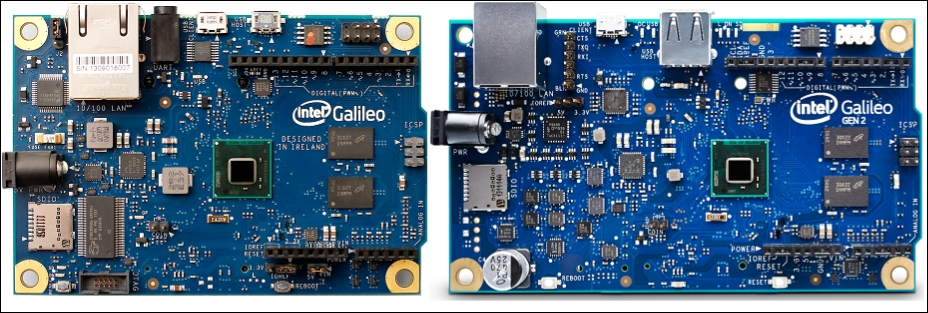The Intel Galileo board is the first in a line of Arduino-certified development boards based on Intel x86 architecture. It is designed to be hardware and software pin-compatible with Arduino shields designed for the UNOR3.
Note
Arduino is an open source physical computing platform based on a simple microcontroller board, and it is a development environment for writing software for the board. Arduino can be used to develop interactive objects, by taking inputs from a variety of switches or sensors and controlling a variety of lights, motors, and other physical outputs.
The Intel Galileo board is based on the Intel Quark X1000 SoC, a 32-bit Intel Pentium processor-class system on a chip (SoC). In addition to Arduino compatible I/O pins, Intel Galileo inherited mini PCI Express slots, a 10/100 Mbps Ethernet RJ45 port, USB 2.0 host, and client I/O ports from the PC world.
Note
The Intel Galileo Gen 1 USB host is a micro USB slot. In order to use a generation 1 USB host with USB 2.0 cables, you will need an OTG (On-the-go) cable. You can see an example cable at http://www.amazon.com/Cable-Matters-2-Pack-Micro-USB-Adapter/dp/B00GM0OZ4O.
Another good feature of the Intel Galileo board is that it has open source hardware designed together with its software. Hardware design schematics and the bill of materials (BOM) are distributed on the Intel website. Intel Galileo runs on a custom embedded Linux operating system, and its firmware, bootloader, as well as kernel source code can be downloaded from https://downloadcenter.intel.com/Detail_Desc.aspx?DwnldID=23171.
Note
Another helpful URL to identify, locate, and ask questions about the latest changes in the software and hardware is the open source community at https://communities.intel.com/community/makers.
Intel delivered two versions of the Intel Galileo development board called Gen 1 and Gen 2. At the moment, only Gen 2 versions are available. There are some hardware changes in Gen 2, as compared to Gen 1. You can see both versions in the following image:

The first board (on the left-hand side) is the Intel Galileo Gen 1 version and the second one (on the right-hand side) is Intel Galileo Gen 2.

